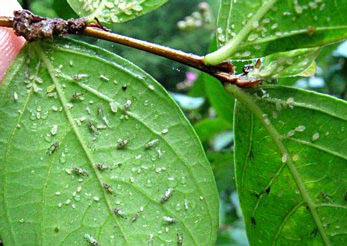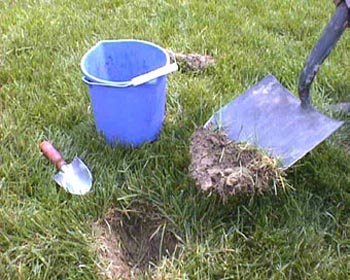Confessions of an Experienced Gardener
By Gil Medeiros, Fairfax Master Gardener
It’s what you learn after you know it all that counts. — John Wooden, Hall of Fame Basketball Coach
Some lessons are hard to put into practice. Maybe you understand intellectually what you should do, but you just can’t bring yourself to do it. For example, in the face of overwhelming evidence, some of us don’t exercise enough, or we eat the wrong foods, or we fiddle with our cellphones while driving.
What brings us to change such habits or mindsets? It could be a near-death experience or the urging of a friend. But it also could be that when we hear the advice for long enough, we grudgingly accept it.
I have gardened in some fashion for the past 37 years. Experience and self-study over that time made me pretty knowledgeable in the garden. Still, there were major gaps in my gardening practices: there were things I knew but did not act upon. Here are three of them.
Insects are not my enemy
There was a time, not so long ago, when I had the juvenile attitude that all insects were bad. My natural inclination was to squash any insect that wandered within striking distance of my hand. Worse, I would use broad spectrum insecticides to kill minor pests in the landscape. Neither training from great entomologists of the mid-Atlantic nor reading the terrific book “Bringing Nature Home” by Doug Tallamy could dent this mindset.
About three years ago there was a turning point for me. I had a reputable company spray for mosquitoes in my yard in advance of a major summer party. I checked the chemical. It was bifenthrin, nothing scary. I talked to the tech about where he would spray and asked that he stay away from anything that was in bloom. And then I watched as he sprayed.
The treatment successfully controlled the mosquitoes for the expected time period. The party was a success, and no one complained about insect bites.

Crape myrtle aphids (Tinocallis kahawaluokalani)
What had happened? Doing some research, I found on the University of Maryland Extension website that others in the area had experienced the same thing. Apparently, the bifenthrin spray controlled the mosquitoes, and it killed off the beneficial insects such as lady beetles and green lacewings that kept the crape myrtle aphids in check.
This was a mini-disaster in my little ecological system. It was a real slap upside the head that led to an awakening on my part. I learned the hard way what I had been taught in the classroom and read in books. Only a few insects are harmful to the landscape and the human inhabitants therein. Many more are beneficial and even necessary to maintain a harmonious balance in nature.
Needless to say, I am now much more respectful of insects. I have actually grown fascinated by them. I love to watch pollinators of every stripe dance on the flowers in my gardens.
And of course I am far more careful about using insecticides. Never again will I commission a wide spraying for mosquitoes or any other pest.
Hand watering is best
If I had read it once, I’d read it a thousand times, maybe ten thousand times: “Avoid overhead watering.” Nevertheless, I continued to use my oscillating sprinkler to water all sorts of plants in my garden. Time was one reason. I had to go to work every day, and I simply did not have the time to do anything other than sprinkler watering.
The plants got their water all right, but they also got early blight, septoria leaf spot, powdery mildew and other diseases that defied my diagnostic ability.
For decades I fought these problems with fungicides, but the chemicals did not work so well on these common fungal diseases.
We have all heard the old saw, sometimes attributed to Albert Einstein, “Insanity is doing the same thing over and over again and expecting different results.” Fortunately, Einstein never said how many repetitions it takes to be certifiable.
Time and again, I learned in the garden the lesson that I found in the literature: fungicides available for my use are PREVENTIVE, not CURATIVE. They have little or no effectiveness in the way I was using them in my garden.
Still, I continued to ignore the simple cultural practice that could mitigate these disease problems: eliminating overhead watering.
In this case I can cite no epiphany like the aphids on my crape myrtles. After I retired from revenue-producing work, I had more time to devote to the garden. During the winter a few years ago, I simply decided to stop the overhead watering. I invested in soaker hoses, and a year later I decided that hand-watering the plants at ground level with a hose and shower head type sprayer would work even better than soaker hoses.
Indeed, hand watering has made a big difference. My new watering practices and the use of plastic sheet mulch have made a world of difference in the vegetable garden. Early blight on the tomato plants has virtually disappeared. I still get some septoria leaf spot, but much later in the season than I had experienced it before. Going into September, there was almost no powdery mildew on either the zucchini or the winter squash.
And it was so simple to do.
Soil testing is important
My academic training is in chemistry, so I understand soil testing very well: how the soil is extracted, how the test solutions are made, and how spectroscopy is used to determine the levels of important soil nutrients. Any observer might assume I have used soil tests for years – even decades – to guide my application of fertilizers and lime.
No. I did it by the seat of my pants.
During my work years, I was known for my advocacy of measurement, my love of numbers. As a gardener, I had none of it. Routinely, I put a handful of 10-10-10 and a handful of lime in every planting hole in the vegetable garden. I did a rough estimate of the size of my lawn and applied fertilizers based on what the bag said about how much area it treated. I applied lime occasionally with no idea what the soil pH was.
Later, as a concession to my measurement instincts, I bought a pretty good soil pH meter and tested several garden beds. The pH readings were about what I expected — right around 6.5. Perfect! I congratulated myself for my genius in managing the soil.
When I enrolled in the Master Gardener program, I decided it was a bit disingenuous to recommend Virginia Cooperative Extension soil tests to our clients if I had never used a single soil test in my decades of gardening. So I decided to test my vegetable garden and one of our ornamental planting beds.

tools required to take soil samples
Now, I am a believer. I should have been all along. Every year, I order soil tests for different garden beds and lawn areas. I have found low soil pH in lawn areas, low potassium levels too, and low organic content in some new garden beds that I was digging. In all of these cases I knew exactly what to do to correct the problem. Without soil testing I would have continued to guess … wrong.
I would like to provide a new service here at Fairfax Gardening. Perhaps we will call it “Catharsis Corner.” If you have a garden confession that you would like to get off your chest, send it to me at editor@FairfaxGardening.org. We will publish it here. We will even withhold your name if you like.